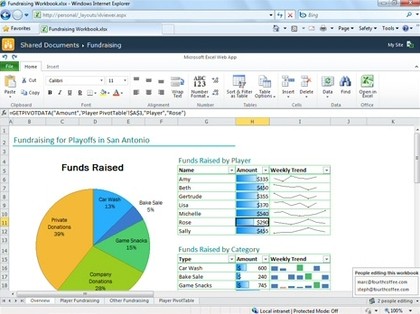How long before local storage is dead?
A cloud-based world is just around the corner... or is it?

PCs, laptops, mobile phones, tablets - many computer users now routinely work on more than one device, and that's just one reason why there's a growing move to the cloud.
Tying your emails, contacts, documents and more to a single system is just too inconvenient: it's far easier to, say, just log on to Gmail or Google Docs from each of your devices as necessary.
There's no hassle, no synchronisation issues, no lost information or other problems - everything just works.
And if you like the idea then Google's Chromebooks give you an opportunity to take cloud computing to a whole new level.
Compact, lightweight and with a long battery life, they could be an appealing replacement for some laptops. And they store just about everything online - bookmarks, cookies, emails, documents, applications and more - so there's no need to worry about backup or sync problems, as all your latest files will be freely available from any web-enabled device.
How far will this go? A Daily Telegraph report on a Microsoft cloud computing conference was emphatic. "In the future, Cloud Computing will be the only choice", the paper wrote, quoting futurologist Dr James Bellini as saying: ""If you go forward to the 2020s a successful enterprise will probably have no chief executive, no headquarters and no IT infrastructure".
This goes far beyond businesses. Google's Vic Gundotra said in 2009 that native apps would become obsolete, and the web will become "the platform that matters", while Google vice president Sundar Pichai claimed that the cloud would be able to satisfy everyone's needs: "Every capability you want today, in the future it will be written as a web application".
Sign up for breaking news, reviews, opinion, top tech deals, and more.
And some have even wondered if this means the end of local storage as we know it, with internet veteran Tristan Louis predicting that, as a result of the arrival of the cloud, much local storage is "going the way of the dodo and will be mostly gone from the tech landscape by 2020".
But is he right - is the cloud destined to rule all? Is it a temporary fad? Or will the cloud co-exist with local storage for the foreseeable future? We consulted some of the leading industry players to see what they thought.
Rapid development
If you're an experienced PC user then it's easy to dismiss the cloud, and laugh at the idea that anyone would be satisfied with only web applications.
But, Google told us, there are many who disagree. "A Google-commissioned third-party survey (with Hall & Partners, 2011) found that 35% of users in an average company use only browser-based applications, and 40% of companies stated that they could feasibly switch all users to a combination of browser and virtualized apps."
And this is only the beginning, Google explained, because the cloud means software can be developed and enhanced far more rapidly than in the past: "The cloud makes possible a tremendous pace of innovation - last year, we brought over 120 new features and applications to Google Apps. Cloud computing presents us with the opportunity to build a new generation of applications which deliver a much faster innovation cycle for IT and integrate information in a way which simply wasn't possible before."

WEB OFFICE: Microsoft's Office 365 provides its apps in the cloud, so you always have the latest versions and they're available from anywhere
Eduardo Alvarez, senior partner at global consulting firm Booz & Company, told FT.com that this rapid development offers many opportunities: "Animoto, a company that enables anyone to produce videos online, is a good example. In April 2008, after launching its Facebook application, Animoto was able to grow its user base from 5,000 to 750,000 in just three days, thanks to Amazon's cloud services. Companies that are agile enough to quickly leverage the cloud in strategically competitive ways will be the leaders of the future."
Given the current state of the world economy, though, perhaps the biggest advantage of the cloud is also the simplest: it saves money. That's why former US Federal Chief Information Officer (CIO) Vivek Kundra put forward a "Cloud First" plan earlier this year, looking to migrate some 25% of Federal government IT spending - an astonishing $20 billion - to the cloud.
It's not yet clear how much this will achieve (and given their record, government claims on computing are best treated with extreme scepticism), but even a small fraction of this cash will be enough to transform the marketplace, boosting the profile of cloud companies and enabling them to even better take on the rest of the industry.

Mike is a lead security reviewer at Future, where he stress-tests VPNs, antivirus and more to find out which services are sure to keep you safe, and which are best avoided. Mike began his career as a lead software developer in the engineering world, where his creations were used by big-name companies from Rolls Royce to British Nuclear Fuels and British Aerospace. The early PC viruses caught Mike's attention, and he developed an interest in analyzing malware, and learning the low-level technical details of how Windows and network security work under the hood.